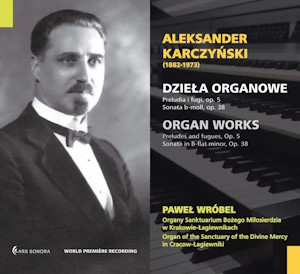
Aleksander Karczyński (1882-1973)
Prelude and Fugue in D minor, Op. 5 No. 1 (1901-05)
Prelude and Fugue in F minor, Op. 5 No. 2 (1901-05)
Prelude and Fugue in E minor, Op. 5 No. 3 (1901-05)
Sonata in B flat minor, Op. 38 (1920-30)
Paweł Wróbel (organ)
rec. 2019, Sanctuary of the Divine Mercy, Crakow, Poland
World premiere recordings
Ars Sonara CD130/31 [2 CDs: 77]
I’m always on the lookout for organ music by lesser known composers, and recently I stumbled on the name Aleksander Karczyński, a Polish organist, conductor and composer. This appears to be the only recording on CD of his music, though I stand to be corrected. This 2 CD set, released by the Polish Label Ars Sonora, features the bulk of his organ output; not included are a few pedagogical works such as 5 Fugues, Op.35 and the 24 Trios in all keys.
Karczyński, whose eleven siblings included three priests and two nuns, hailed from Pelplin, a town in northern Poland. He studied for four years at the Royal Academy of Music in Munich, where his teachers included pianist and composer Ludwig Thuille, conductor Felix Mottl and organist Ludwig Meier. It’s speculated that whilst in Munich he had some tuition from Max Reger. In 1907 he emigrated to the States, where he remained for the next sixty years. He assumed the role of organist at two of Chicago’s churches, St. Peter and Paul, and then St. Innocent in addition to playing an active role in the musical activities of the city as a conductor, mainly of choral groups. He was also a notable journalist and publicist. At the end of his life he returned to Poland, where he died in December 1973 aged 91.
The three Preludes and Fugues, Op. 5 are student works dating from Karczyński’s years in Munich. As already mentioned, there is a great possibility that he met Max Reger at the time and came across his organ works. Reger’s influence is notable throughout the three Op. 5 works in Karczyński’s frequent employment of elaborate chromatic figurations. The first Prelude emerges gloomily from the lowest of bass notes. It has a wistful air about it, whilst the fugue doffs its hat to baroque composers. No. 2 is ushered in by a chorale of mighty chords. Then more lyrical sections intervene. The Fugue is characterized by ascending and descending semiquaver patterns. The third Prelude is warm and intimate, eventually calling for more virtuosity as it progresses. A five-part fugue reveals Karczyński’s expert skill in polyphonic writing.
At 34 minutes duration, the three movement Sonata in B flat minor, Op. 38 is a mighty edifice. It occupied the composer for ten years between 1920 and 1930. It’s described in the liner as “one of the most representative Polish organ works of late Romanticism”. In it Karczyński makes passing reference to Guilmant’s and Nowowiejski’s organ works. Mighty chords usher in the opener, which is marked Grave. The movement is cloaked in solemnity, yet moments of more subdued luminosity break through from time to time, offering satisfying moments of contrast. The coda provides a final surge of virtuosity to close the movement. The Adagio di molto offers an element of soothing balm, and Wróbel paints the glowing bucolic landscape in an array of attractive, luminescent sonorities. The finale welds virtuosity to fiery temperament. A fugue is thrown in for good measure, and a final coda closes the work with an epic imperious climax.
All the works featured on this 2 CD set are receiving their world premiere recordings. Paweł Wróbel performs these intriguing scores with smouldering conviction, sensitively exploiting the impressive range of the magnificent Dariusz Zych organ (2018). The dynamic range is breathtaking and there’s no loss of detail in the Sanctuary’s expansive acoustic. The instrument’s specifications are contained in the accompanying booklet. This has been, for me, an immensely pleasurable first encounter with organ works which cry out imploringly for wider currency.
Stephen Greenbank
Availability: Ars Sonara


















